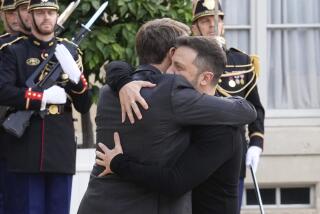Soviets Start Campaign to Woo West Europeans
- Share via
LONDON — Viktor P. Karpov, the senior Soviet nuclear arms negotiator, on Tuesday launched Moscow’s diplomatic efforts to woo West European opinion after the Reykjavik summit, providing senior British officials with the Soviet version of why no arms control accord was reached and stressing his country’s desire to follow up any breakthroughs that had been achieved.
At an hourlong news conference at the Soviet Embassy following talks with Prime Minister Margaret Thatcher and a Foreign Office minister, Karpov blamed the United States for the failure at Reykjavik, but he was quick to confirm that Moscow’s proposals still stand.
“Yes, it’s on the table,” he said of the Soviet package proposed at Reykjavik.
Assessing the Events
Karpov said that both sides require time to assess the events in Reykjavik, but he predicted that Moscow would not take long to re-establish its positions.
“I think it will be a speedy deliberation, because the various issues dictate that it’s not a time for deliberation, but for action,” he stated. “We are for action.”
However, he declined to speculate when Soviet leader Mikhail S. Gorbachev and President Reagan might meet again.
Although he was, at times, ambiguous and contradictory, the underlying tone of Karpov’s message appeared to be positive and to signal Moscow’s willingness to follow up the Reykjavik summit as quickly as feasible.
Strenuous efforts by both the U.S. and Soviet leaders in rejecting the idea that Reykjavik was a failure have lifted the overwhelming sense of disappointment that hung over West European capitals immediately after the summit.
To Meet West Germans
Karpov travels to Bonn today for talks with West German leaders before returning to Moscow. Meanwhile, Soviet Foreign Minister Eduard A. Shevardnadze briefed Warsaw Pact foreign ministers on the summit at a meeting in the Romanian capital, Bucharest.
Karpov met for 90 minutes with Thatcher, twice as long as originally scheduled. Emerging from the prime minister’s office, he described the talks as useful.
“We agreed that there should be a search for a way out of these situations and we agreed it needs efforts on both sides,” he said.
Thatcher is widely seen as the European leader closest to President Reagan, and she also leads a key European nation in the Atlantic Alliance, factors that political observers believe brought Karpov first to London.
Details of the talks were not disclosed, but a Thatcher aide said after the meeting that the prime minister believes there are still grounds for negotiations.
At his news conference, the seasoned Soviet diplomat stated flatly that agreements eliminating medium-range nuclear missiles in Europe, eliminating strategic nuclear missiles and banning nuclear weapons testing were possible without an accord on Reagan’s controversial anti-missile system, the Strategic Defense Initiative.
“The principle that there can be separate solutions is there,” Karpov said.
However, in an apparent contradiction, he described these same areas where Reagan and Gorbachev had found common ground as part of a package that, in Reykjavik, had to include SDI, also known as “Star Wars.”
Karpov also seemed to raise doubts that the Soviet proposals would be re-offered in the same form as presented at Reykjavik.
“We’re not retracting our proposals made at Reykjavik, but in what context and how they will be presented at the Geneva negotiations would depend upon the results of our considerations,” he said.
Repeatedly Blames Americans
Although signaling a desire to resume talks with the United States, Karpov repeatedly blamed the Americans, both for the lack of progress at the Geneva negotiations and for the absence of agreement in Reykjavik.
He also criticized the revised U.S. interpretation of the 1972 Anti-Ballistic Missile Treaty, which would allow testing and development of SDI, now in its laboratory phase, and criticized the arming of U.S. Air Force B-52 bombers with cruise missiles as an escalation of the arms race.
Karpov described the U.S. idea of a space defense system as “useless as a military factor” but dangerous because it could lead a country to believe it could start a nuclear war with impunity.
While there were no substantive reports of Shevardnadze’s meeting with Warsaw Pact foreign ministers, it is widely known that Moscow’s principal East European allies, including East Germany and Hungary, view arms control and detente as pivotal to greater access to Western technology required for their own economic growth and prosperity.
More to Read
Sign up for Essential California
The most important California stories and recommendations in your inbox every morning.
You may occasionally receive promotional content from the Los Angeles Times.












